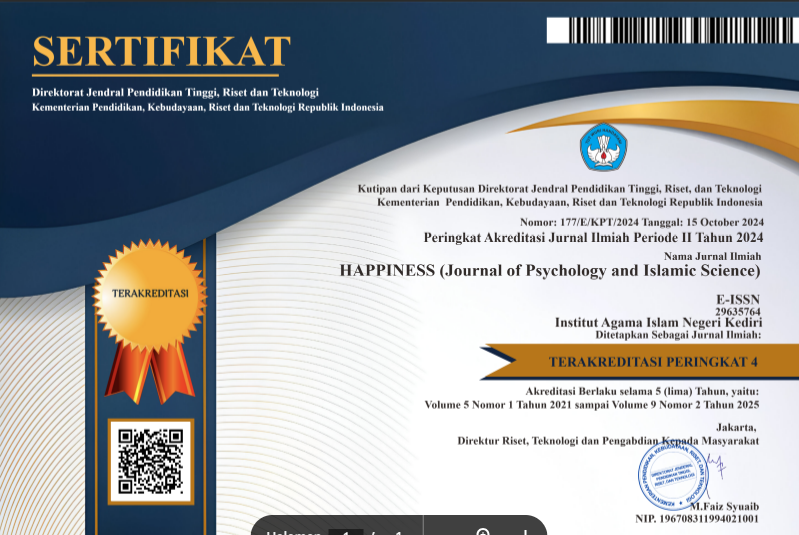Academic Stress and Resilience as Predictors of Pro-Social Behaviour among Undergraduates of Adekunle Ajasin University Akungba-Akoko
DOI:
https://doi.org/10.30762/happiness.v8i1.2177Keywords:
Academic Stress, Pro-Social Behavior, Resilience, UndergraduatesAbstract
The problems of pro-social behavior among individuals have been in existence from the recorded history. Studies that have investigated pro-social behavior have used different predictors and populations with varied results. Therefore, this study investigated academic stress and resilience as predictors of pro-social behavior among first year undergraduates of Adekunle Ajasin University, Akungba-Akoko, Ondo State, Nigeria. The study adopted cross-sectional survey design while convenience sampling technique was used to collect data from 219 participants using the Pro-social Behavior Scale, Maslach Burnout Inventory and Resilience Scale. Data collected were analyzed using multiple regressions to test three hypotheses which were accepted at a p < .05 level of significance. The result showed that academic stress and resilience jointly predicted pro-social behavior among study participants [R2 =.10, F (2,216) =11.88, p < .05]. In addition, academic stress (β= -.26, p < .05) independently predicted pro-social behavior while resilience did not independently predict pro-social behavior among study participants (β = .12, p > .05). The study concluded that academic stress is a strong predictor of pro-social behavior among study participants. It is recommended that university management and other stakeholders should organize regular seminars on stress reduction techniques that would encourage activities that would lead to pro-social behavior among undergraduates.
Downloads
References
Afolabi, O.A. (2013). Roles of personality types, emotional intelligence and gender differences on pro-social behavior. Psychological Thought, 6 (1), 124- 139.
Aderibigbe, J.K. & Themba, Q.M. (2019). Relationship between occupational stress, organizational citizenship behavior, psychological capital and emotional intelligence among Nigerian employees. Research Gate, 14(1), 85-111.
Akanni, A.A. Obi, I.N. & Oduaran, C.A. (2022). Occupational stress, emotional intelligence and psychological wellbeing of nurses in government-owned hospitals. European Review of Applied Sociology, 5(24), 21-29.
Akintunde-Adeyi, J. F. A. Akinbode, J. O. & Akinola, E. T. (2023). Employees’ resilience, organizational culture and sustainable performance of tertiary hospitals in Oyo State, Nigeria. Intern. Journal of Profess. Bus. Review, 8(11), 1-22.
Aknin, L. B., Dunn, E. W., Sandstrom, G. M., & Norton, M. I. (2013). Does social connection turn good deeds into good feelings? On the value of putting the ‘social’ in pro-social spending. International Journal of Happiness & Development, 1(2), 155-171.
Alarcón, G. & Forbes, E.E. (2017). Pro-social behavior and depression: A case for developmental gender differences. Current Behavioral Neuroscience Report, 4, 117–127.
Arogundade, O.T. & Oladipupo, L. (2019). The influence of perceived stress on the organizational citizenship behavior of bankers in Ikeja, Lagos State. European Scientific Journal, 12(17), 449-457.
Babapour, A.R. Gahassab-Mozaffari, N. & Fathnezhad-Kazemi, A. (2022). Nurses’ job stress and its impact on quality of life and caring behaviors: A cross-sectional study. BMC Nursing, 21(7), 5-11.
Bakker, A.B. Demerouti, E. & Verbeke, W. (2004). Using the job demands‐resources model to predict burnout and performance. HRMAGAZINE, 43(1), 83-104.
Berdida, D. J. E., & Grande, R. A. N. (2022). Academic stress, COVID-19 anxiety, and quality of life among nursing students: The mediating role of resilience. International Nursing Review, 10(1), 111-18.
Bliege Bird, R. B., & Smith, E. A. (2005). Signaling theory, strategic interaction, and symbolic capital. Current Anthropology, 46, 221–248.
Caprara, G. V., Kanacri, B. P. L., Zuffianò, A., Gerbino, M., & Pastorelli, C. (2015). Why and how to promote adolescents’ pro-social behaviors: direct, mediated and moderated effects of the CEPIDEA school-based program. Journal of Youth & Adolescence, 44(1), 2211–2229.
Demerouti, E. Bakker, A.B. Nachreiner, F. & Schaufeli, W.B. (2001). The job demands-resources model of burnout. Journal of Applied Psychology, 86, 499-512.
Durlak, J. A., Weissberg, R. P., Dymnicki, A. B., Taylor, R. D., & Schellinger, K. B. (2011). The impact of enhancing students’ social and emotional learning: A meta-analysis of school-based universal interventions. Child Development, 82, 405–432.
Eisenberg, N., Spinrad, T. L., Knafo-Noam, A. (2015). Pro-social development. In M. E. Lamb & R. M. Lerner (Orgs), Handbook of child psychology and developmental science: Socio-emotional processes (Vol. 3, pp. 610–656). John Wiley & Sons.
Gurven, M., Allen-Arave, W., Hill, K., & Hurtado, M. (2000). It’s a wonderful life: Signaling generosity among the Ache of Paraguay. Evolution & Human Behavior, 21, 263–282.
Haller, E.; Lubenko, J.; Aydın, G.; Chong, Y.Y. & Chien, W.T. (2022). To help or not to help? Pro-social behavior, its association with well-being, and predictors of pro-social behavior during the corona virus disease pandemic. Frontier Psychology, 12, 775032.
Harris, M.W.; Byrne, K.A. Kowalski, R.M.; & Liu, Y. (2022). More relaxed but less helpful: the relationship between stress, age, and self-reported pro-social behavior during the COVID-19 pandemic. Psychologists, 4, 833–842.
Högberg, B., Strandh, M., & Hagquist, C. (2020). Gender and secular trends in adolescent mental health over 24 years – The role of school-related stress. Social Science & Medicine, 250, 112890.
Jeyasingh, E.S. (2022). Coping strategies for adolescents dealing with academic stress. Saudi Journal of Nursing Health Care, 5(1): 7-11.
Leontopoulou, S. (2010). An exploratory study of altruism in Greek children: relations with empathy, resilience and classroom climate. Psychology, 1(5), 377-385.
Luo, Y. Ma, T. & Deng, Y. (2023). School climate and adolescents’ pro-social behavior: the mediating role of perceived social support and resilience. Frontier in Psychology. 14, 1095566.
Maslach, C., & Jackson, S.E. (1986). Maslach burnout inventory manual 2nd ed.). Consulting Psychologists Press.
Martin, A.J. & Marsh, H. W. (2019). Investigating the reciprocal relations between academic buoyancy and academic adversity: Evidence for the protective role of academic buoyancy in reducing academic adversity of time. International Journal of Behavioural Medicine,44(4), 301-312. https//doi. 10.1177/016502541988502.
Martí- Vilar, M., & Navarro, R. (2017). Lo que dice la ciencia sobre la empatía y algunos cuestionarios útiles. In E. R. Roche & P. Escotorin (Eds.), Cuidar con actitud pro-social. Nuevas propuestas para cuidadores (pp. 141– 170). Ciudad Nueva.
Martí- Vilar, M., Tortosa, A. C., Sales- Galán, A., & Corradi, G. (2022). Resilience and pro-social behaviour in Spanish care professionals of dependent persons. Health & Social Care in the Community, 30, e6613– e6621.
Martinsone, B. Stokenberga, I. & Camilleri, L. (2022). Adolescent social emotional skills, resilience and behavioral problems during the COVID-19 pandemic: A longitudinal study in three European countries. Front. Psychiatry 13, 942692.
Mayorga NA, Jardin C, & Bakhshaie J, (2018). Acculturative stress, emotion regulation, and affective symptomology among Latino a college students. Journal of Counseling Psychology, 65(2):247–258.
McAndrew, F. T. (2019). Costly Signaling Theory. In: T. K. Shackelford, V. A. Weekes-Shackelford (eds.), Encyclopedia of Evolutionary Psychological Science, https://doi.org/10.1007/978-3-319-16999-6_3483-1.
Memmott-Elison, M.K. Maiya, S. J. Dicus, L. & Gustavo, C. (2020): Relations between stress, coping strategies, and pro-social behavior in U.S. Mexican college students. Journal of American College Health, 3(2), 1-7.
Moore, Q.I. Kulesza, C. Kimbro, R. & Jackson, F. (2020). The role of pro-social behavior in promoting physical activity, as an indicator of resilience, in a low-income neighborhood, Behavioral Medicine, 46 (3-4), 353-365.
Nwankwo, B.C. Onyemaechi, N.P. Ogbonnaya, K.E. & Okechi, B.C. (2018). Pro-social behaviour and gender as predictors of coping with sports stress among adolescents. International Journal of Social Sciences and Management Research, 4(9), 15-29.
Ogunleye, A.J. Bankole, E.J. & Oke, O.S. (2021). Employees’ resilience, hope and optimism as predictors of workplace civility and organizational citizenship behavior. KIU Interdisciplinary Journal of Humanities & Social Sciences, 2(2), 118-133.
Ogunsola, K. & Lasode, D.O. (2017). Social and technology factors affecting knowledge sharing among architects in architectural firms in Ibadan, Nigeria. African Journal for Psychological Studies of Social Issues, 132-151.
Oladipupo, S.O. & AbdulRahman, T.H. (2018). Predicting knowledge sharing behaviour among nonacademic staff in University of Ibadan, Nigeria. Library Philosophy & Practice (e-journal). 2093, 1-24.
Oleksa-Marewska, K. (2020). Organizational climate as a mediating factor between occupational stress and pro-social organizational behaviours in knowledge-based organizations. European Research Studies Journal, 28(2), 741-762.
Roche, A.I. Adamowicz, J.L. Stegall, M.S. & Thomas, B.K. (2022). College student resilience during Covid‑19: Examining the roles of mindfulness, compassion, and pro-social behavior. Adversity & Resilience Science, 3, 309–320.
Smith, B.W., Dalen, Wiggins, K., Tooley, E., Christopher, P. & Bernard, P. (2008). The brief resilience scale:Assessing the ability to bounce back. International of Behavioural Medicne, 15(3), 194-200. DOI: 10.1080/10705500802222972.
Sollberger, S., Bernauer, T., & Ehlert, U. (2016). Stress influences environmental donation behavior in men. Psychoneuroendocrinology, 63, 311-319.
Tendhar, T. & de Mesquita, P.B. (2020). Compassion education for pro-social behavior and well-being compassion education for pro-social behavior and well-being among college students. Journal of Mental Health & Social Behaviour, 2 (1):115-121.
Thapliyal, G. & Gupta, D. (2015). A study of pro-social behaviour and self-concept of adolescents. Journal of Educational Psychology, 9(1), 38-45.
Tohtayong, A. (2018). The effectiveness of academic resilience modules (ARM) in enhancing academic resilience and academic achievement among students at risk in three southernmost provinces of Thailand. Doctor of Philosophy Thesis.
Van Damme, L. Vanderplasschen, W. & Collins, O. F. (2022). The role of personal resilience and interpersonal support in building fulfilling and pro-social lives: examining the good lives model among young women four years after youth detention. International Journal of Offender Therapy & Comparative Criminology, 66 (1), 123-144.
Von Dawans, B.; Fehr, E. & Heinrichs, M. (2012). The social dimension of stress reactivity: Acute stress increases pro-social behavior in humans. Psychol. Sci., 23, 651–660.
Wei, X., Wang, R., & Macdonald, E. (2015). Exploring the relations between student cynicism and student burnout. Psychological Reports, 117(1), 103-115. DOI: 10.2466/14.11.PRO.117c14z6.
Yuin, F.J. & Yaacob, S.N. (2018). Correlates of stress among female adolescents. Journal of Psychology, Malaysia 32 (1), 126-135.
Zuffianò, A., Martí-Vilar, M., & López-Pérez, B. (2018). Pro-sociality and life satisfaction: A daily-diary investigation among Spanish university students. Personality & Individual Differences, 123, 17-20.
Downloads
Published
How to Cite
Issue
Section
License
Copyright (c) 2024 Olukayode A. Afolabi, Anthony G. Balogun, Adebola E. Adejugbe, Emmanuel E. Uye

This work is licensed under a Creative Commons Attribution-ShareAlike 4.0 International License.





















